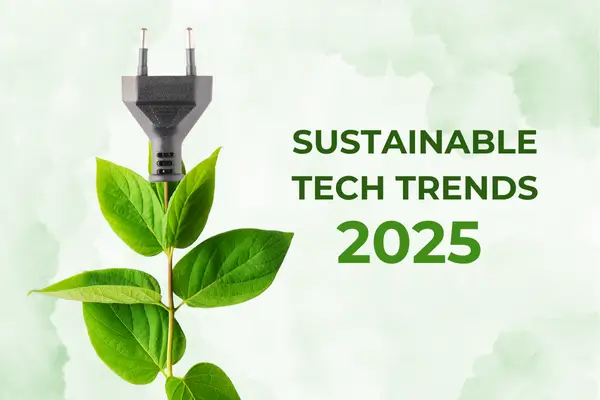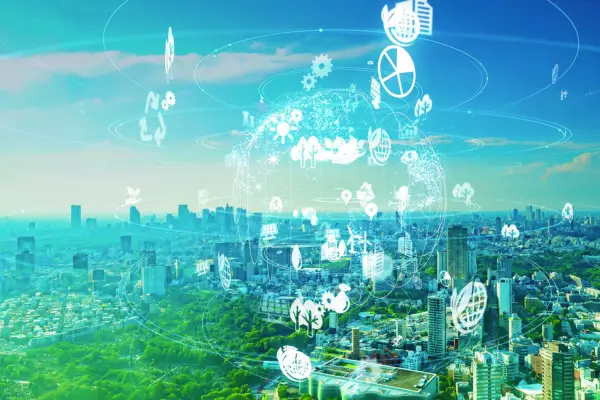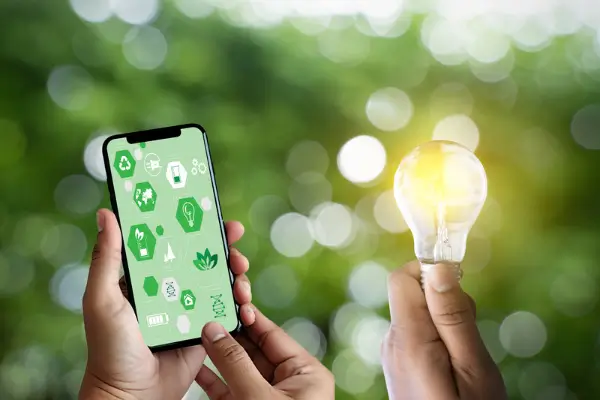The rise of sustainable tech in everyday life
Sustainable technology is no longer a niche interest; it’s becoming an integral part of how we live. From smart devices that optimize energy use to apps promoting eco-friendly habits, green tech is transforming our daily routines. As climate concerns grow, more individuals are turning to innovative tools to reduce their environmental impact.
This article explores the practical side of sustainable tech, highlighting tools and innovations that can easily fit into everyday life. These advancements not only help lower carbon footprints but also simplify the journey toward sustainable living.
The aim is to empower readers with actionable insights into adopting green technology. Whether you’re interested in smart home devices, eco-friendly apps, or renewable energy solutions, there are accessible options for everyone. By embracing these technologies, we can collectively drive change and contribute to a greener, more sustainable future.
Smart home technologies for a greener future
Energy efficiency at your fingertips
Smart home technologies are revolutionizing how we manage energy. Devices like smart thermostats learn your routines and adjust heating and cooling to save energy without sacrificing comfort. For instance, the Nest Thermostat can reduce energy usage by up to 12% on heating and 15% on cooling annually. Similarly, smart lighting systems like Philips Hue allow for remote control and scheduling, ensuring lights are only on when needed.
Water-saving innovations
Water efficiency is another area where smart tech shines. Devices like Rachio Smart Sprinklers optimize irrigation by considering local weather conditions, preventing water waste. Smart water monitors, such as Flume, track household water usage in real-time and alert users to leaks or excessive consumption. These tools make it easy to conserve water and reduce utility bills.
Minimizing household waste
Managing household waste becomes effortless with tech tools like Lomi or Vitamix FoodCycler, which transform food scraps into nutrient-rich compost. Additionally, smart refrigerators can track expiration dates and suggest recipes to help reduce food waste. These innovations encourage sustainable habits while simplifying waste management at home.
A sustainable transformation
Incorporating smart home technologies creates immediate environmental and financial benefits. By adopting energy-efficient devices, water-saving tools, and waste-reducing gadgets, households can take a significant step toward sustainability while enjoying the convenience and savings these innovations offer.
Eco-friendly apps and tools for daily living
Track your impact with carbon footprint apps
Understanding your environmental impact is the first step toward change, and apps like Earth Hero and Klima make this easy. These tools help you calculate your carbon footprint by analyzing your daily habits, such as transportation, energy use, and diet. They also offer personalized tips for reducing emissions and tracking your progress. By visualizing your impact, these apps empower you to make more informed decisions.
Shop smarter with sustainable marketplaces
Eco-friendly shopping is more accessible than ever with apps that prioritize sustainability. Platforms like Good On You rate fashion brands based on their ethical and environmental practices, helping you choose clothing that aligns with your values. For home and lifestyle needs, DoneGood connects users to brands offering sustainable, fair-trade products. These apps simplify conscious shopping and make it easier to support businesses that prioritize the planet.
Fight food waste with innovative solutions
Food waste apps like Too Good To Go and Olio are making a significant impact by connecting users with surplus food from local restaurants and neighbors. These platforms enable you to save perfectly good food from going to waste while supporting the community. Whether it’s purchasing discounted meals or sharing extra groceries, these apps turn small actions into meaningful environmental contributions.
Small steps with big impacts
Integrating eco-friendly apps into your daily life promotes sustainable habits without requiring drastic changes. By leveraging technology to track your impact, shop responsibly, and reduce food waste, you’re taking powerful steps toward a more sustainable lifestyle while encouraging others to do the same.
Green transportation solutions for everyday life
The rise of accessible electric vehicles (EVs)
Electric vehicles are becoming more affordable and practical for everyday use. With advancements in battery technology, EVs now offer longer ranges and faster charging times, making them a viable alternative to traditional cars. For instance, the average EV can now travel over 250 miles on a single charge, and fast-charging stations can power them up in under 30 minutes. This shift not only reduces greenhouse gas emissions but also promotes energy independence by using renewable energy sources for charging.
Personal mobility with e-scooters and bikes
For shorter commutes, e-scooters and electric bikes are gaining popularity as sustainable and cost-effective transportation options. Cities around the world are investing in shared mobility programs, allowing residents to rent e-scooters and e-bikes for quick trips. These options reduce traffic congestion, lower emissions, and provide an active way to travel. Personal e-scooters, such as those by Segway, are also becoming affordable and convenient for individual use.
Shared rides and public transport apps
Carpooling and public transportation apps, like BlaBlaCar and Citymapper, are making shared and eco-friendly travel easier to navigate. By connecting users with ride-sharing options or optimizing public transit routes, these tools reduce the number of vehicles on the road and the associated carbon emissions. Public transit systems are also integrating hybrid and electric buses, further enhancing their environmental benefits.
A cleaner commute
Switching to greener transportation options not only lowers your carbon footprint but also saves money and time. By embracing EVs, e-scooters, and public transport, you contribute to cleaner air, reduced congestion, and a more sustainable future for urban mobility.
Technology for waste and recycling
Smart recycling solutions
Sorting recyclables can be confusing, but smart recycling bins like Bin-e and apps like Recycle Coach are simplifying the process. These technologies identify materials using AI and provide guidance on proper disposal. Smart bins even separate waste into categories like plastic, glass, and paper automatically, ensuring that recyclables are correctly processed and reducing contamination.
Digital platforms for reuse and resale
Online platforms promoting reuse and resale are transforming waste management. Apps like Depop and Facebook Marketplace encourage people to buy and sell pre-owned goods, extending the lifecycle of items and reducing waste. Similarly, Freecycle connects users who want to donate or receive free items, promoting a circular economy where resources are shared rather than discarded.
Home composting made easy
Compact, tech-enabled composting devices like Lomi or Vitamix FoodCycler are bringing composting to urban households. These devices convert food scraps into nutrient-rich compost within hours, making it easier than ever to divert organic waste from landfills. They also produce less odor and require minimal maintenance compared to traditional composting methods, making them ideal for small spaces.
A waste-free future
Adopting tech-driven waste management solutions reduces the environmental impact of household waste while encouraging sustainable habits. Whether through smart recycling, digital marketplaces, or composting devices, these tools make it easy to manage waste responsibly and support a cleaner, greener future.
Renewable energy solutions for your home
Solar power for residential use
Installing solar panels remains one of the most effective ways to harness renewable energy at home. Advances in solar technology, such as bifacial panels and solar tiles, have made these systems more efficient and visually appealing. Many homeowners are also taking advantage of government incentives and tax breaks to offset installation costs. A typical solar panel system can reduce household carbon emissions by up to 3,000 pounds annually, providing significant environmental and financial benefits.
Portable renewable energy devices
For those not ready to commit to full-scale solar installation, portable renewable energy options offer a practical alternative. Solar chargers for gadgets, solar-powered lights, and small wind turbines can be used to reduce reliance on grid electricity. These devices are especially useful for outdoor activities or as backup power solutions, allowing individuals to integrate renewable energy into their lives without major investments.
Shared renewable energy systems
Community solar programs are making renewable energy accessible to more people, even those who cannot install panels on their properties. These programs allow residents to buy or lease a share of a solar farm and receive credits on their utility bills for the energy generated. Similarly, shared wind farms and other collective energy projects are gaining traction, empowering communities to transition to cleaner energy sources collaboratively.
Powering a sustainable future
Integrating renewable energy solutions into your home or community reduces reliance on fossil fuels and promotes a more sustainable lifestyle. From installing solar panels to joining community energy projects, these innovations provide practical ways to embrace renewable energy and contribute to a greener planet.
Embracing the future with green technology
Throughout this article, we’ve explored transformative green technologies that empower individuals to reduce their environmental impact. From smart home devices that optimize energy and water use to waste management tools and renewable energy solutions, these innovations make sustainability more accessible and practical. Adopting eco-friendly apps and green transportation options further enhances the ability to live a more conscious lifestyle.
Now is the time to integrate these technologies into your everyday life. Whether by switching to a green energy plan, using smart appliances, or exploring community renewable projects, small changes can lead to significant results. Take the first step by identifying one or two solutions that fit your needs and start building a more sustainable routine.
Looking ahead
As we embrace green technology, the collective impact of individual actions will help shape a healthier, more sustainable planet. These innovations not only address environmental challenges but also improve quality of life, making it easier to live in harmony with our surroundings. Together, we can harness the potential of these advancements to create a future that benefits both people and the planet.




